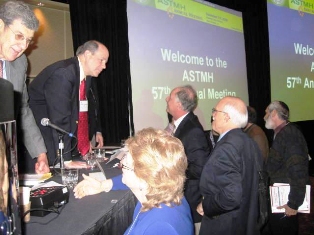
 |
| News & Outreach |
|
||||||
Global Health MattersNovember - December, 2008 | Volume 7, Issue 6
Global health leaders cite Fogarty's role Fogarty senior scientist Dr. Joel Breman (left) and Dr. Stephen Calderwood of Massachusetts General Hospital greet some of the world's leading global health experts at a 40th anniversary symposium held in conjunction with the American Society of Tropical Medicine and Hygiene meeting in New Orleans. The topic was "Developing Great Leaders in Tropical Medicine," and four of them told an audience of global health experts how Fogarty has done it. Grantees who have become scientific stars celebrated the Center's 40th anniversary year at a symposium at the American Society of Tropical Medicine and Hygiene annual meeting in New Orleans, where a rare snowfall belied the subject matter. Fogarty's small training and research grants to encourage young scientists are "the best return on investment we could ever make," Director Dr. Roger I. Glass, said. "It's good for science. It's good for diplomacy...Our best friends overseas are people who have been trained in these kinds of programs." Dr. King Holmes of the University of Washington, whose Fogarty-funded programs on AIDS research in Africa and Latin America have supported 207 foreign and 33 U.S. scholars, said, Fogarty is "the most important sponsor and catalyst for global health research and training in the HIV/AIDS field. It is responsible for thousands of research careers, including my own." Noting that Fogarty is "the most underfunded NIH program," Holmes praised the Center's influence and cost-effectiveness. "Thousands are likely to become professors and research directors who train their own mentees to carry on research," he said. Thanking Fogarty for supporting his early studies, epidemiologist Dr. Nathan Wolfe of Stanford University and the Global Viral Forecasting Initiative, explained how a "food security crisis" in Central Africa along with rapid urbanization has created a market for small game, or "bush meat." The contact by hunters and communities with microbe-infected animal organs and blood can breed new viruses--and pandemics--more rapidly than ever, he said. "Just as we discovered in the 1960s that it is better to prevent heart attacks than try to treat them, over the next 50 years we will realize that it is better to predict and stop pandemics before they spread," he said. Dr. Stephen B. Calderwood, chief of infectious diseases at Massachusetts General Hospital, calling Fogarty "critical in making advances in global health research," reviewed the work of Center-sponsored trainees in his anti-cholera program in Bangladesh, which has produced 29 peer-reviewed papers from Fogarty trainees in recent years. Malaria research conducted by Dr. Philip J. Rosenthal of the University of California, San Francisco, has produced about two dozen trainees supported by Fogarty since 2000. These scientists, working in Uganda and Burkina Faso, have made advances in anti-malarial therapies and have been tracking the spread of the disease among children and describing HIV-malaria co-infection. Fogarty senior scientist Dr. Joel Breman, who brought the panelists together, explained the Center's success. "Our programs are flexible, funding categories can move back and forth, and our grants are leveraged with other sources of funding. The center of gravity moves into the country where we are operating. More and more, the research is linked to public health programs--research tied to policy."
Should you require Adobe Acrobat for viewing PDFs, current and free accessible plug-ins are available at the Adobe website.
|
|||||||
|